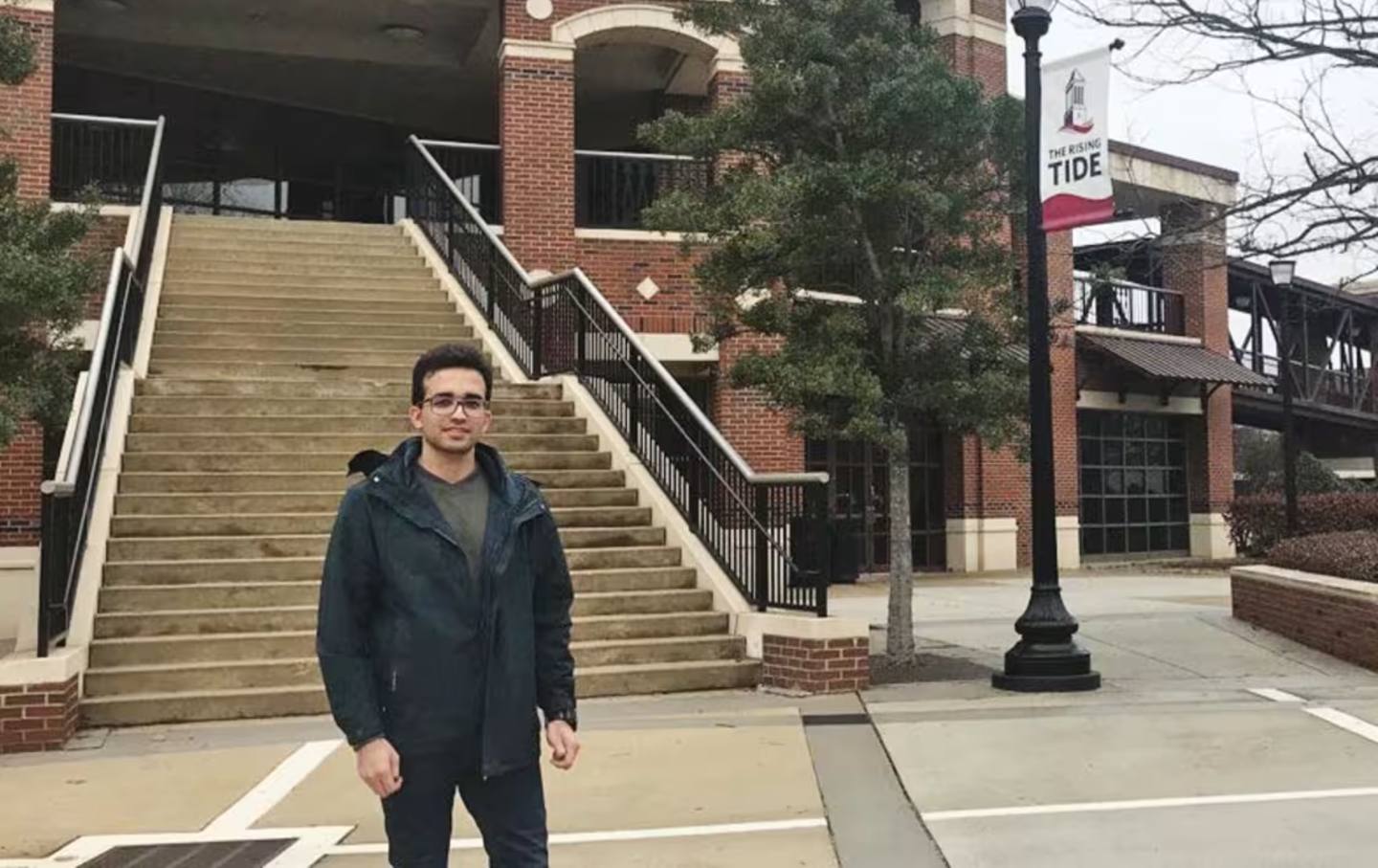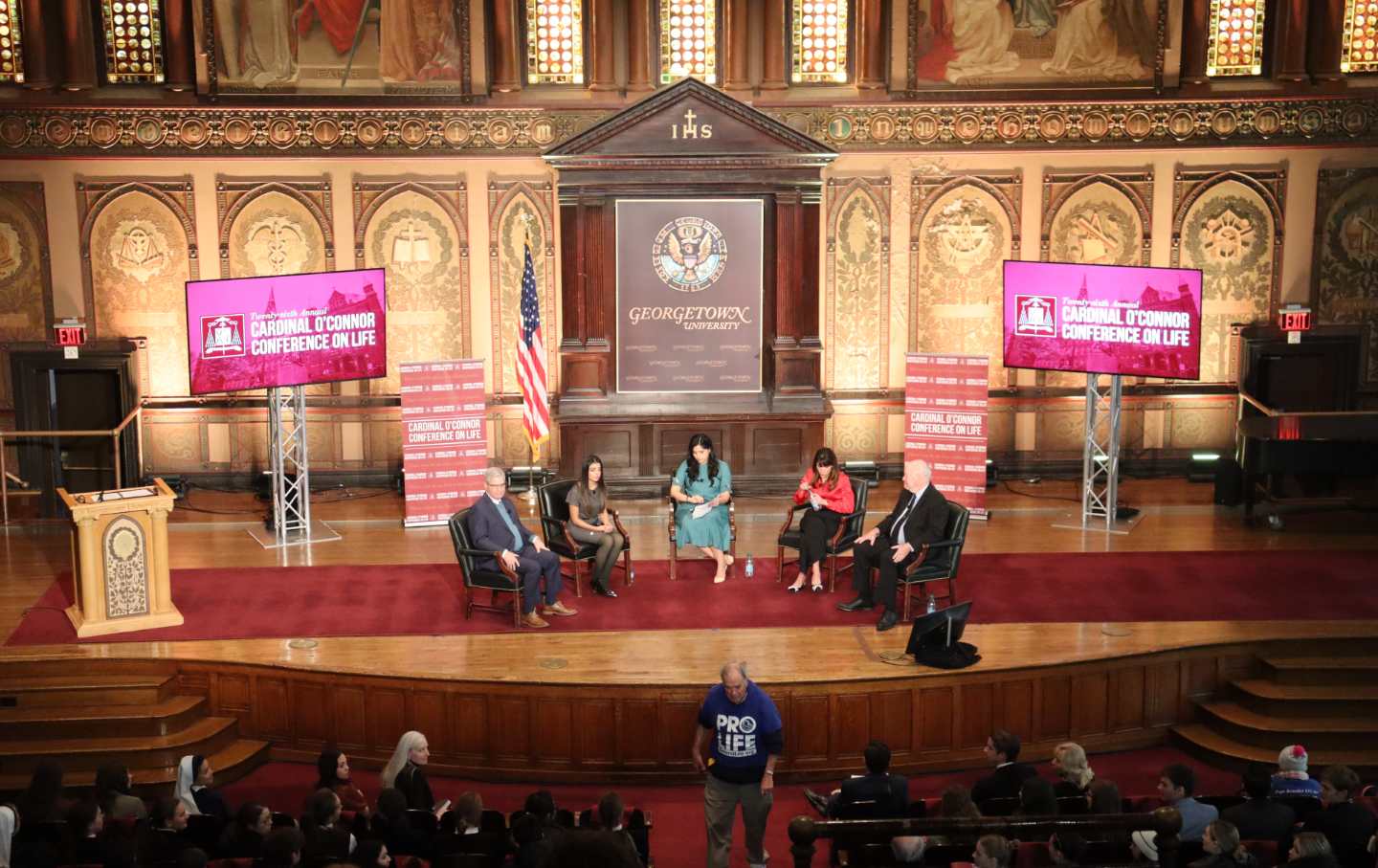The Supreme Court’s Latest Abortion Ruling Is a Cynical Ploy
While the court voted to allow emergency abortions in Idaho, conservatives made it clear that this is only a temporary victory—one they will overturn after the election.

Justice Amy Coney Barrett speaks at the Federalist Society’s 2023 Antonin Scalia Memorial Dinner.
(Jahi Chikwendiu / The Washington Post via Getty Images)
It would appear that some of the Republican justices on the Supreme Court have been made aware that their extremist positions on reproductive rights are wildly unpopular. It would seem that at least some of them have noticed that the court’s barbaric rulings hurt Republican candidates for elected office. So when given the opportunity to make another atrocious ruling that would leave pregnant people to suffer and die at the hands of religious conservatives, a few of these justices looked at the calendar, blinked, and decided to wait until after the November elections to resume their attacks on women’s health.
In the process, the conservatives told us exactly how they’re going to continue to take away reproductive rights after the election, even if Democrats manage to win.
That’s my read on today’s ruling in Moyle v. United States, a case that took up the question of whether patients in Idaho are entitled to emergency medical care either to save their lives or preserve their health, if that care includes an abortion. The issue here is entirely of the Supreme Court’s own making. Abortions, some might remember, used to be protected as a constitutional right. But in 2022, in Dobbs v. Jackson Women’s Health Organization, the Supreme Court, for the first time in American history, revoked a right and allowed states to force people to bring pregnancies to term against their will.
In 2023, Idaho took the license given to it by the Supreme Court and criminalized abortion. The actual Idaho law always gets lost when people are talking about this case, but it is the most extreme version of a forced-birth bill. It reads:
Except as provided in subsection (2) of this section, every person who performs or attempts to perform an abortion as defined in this chapter commits the crime of criminal abortion. Criminal abortion shall be a felony punishable by a sentence of imprisonment of no less than two (2) years and no more than five (5) years in prison. The professional license of any health care professional who performs or attempts to perform an abortion or who assists in performing or attempting to perform an abortion in violation of this subsection shall be suspended by the appropriate licensing board for a minimum of six (6) months upon a first offense and shall be permanently revoked upon a subsequent offense.
The law mentions exceptions in “subsection 2.” Those exceptions cover situations where an abortion is “necessary to prevent the death of the pregnant woman” as well as cases of rape or incest as long as the abortion is performed in the first trimester and the victim has filed a police report. But the law never defines what “necessary” actually means, doesn’t tell us how close to death the patient has to be, and doesn’t specify how much intense pain and suffering the patient has to go through before passing a mass of cells out of her system. Notably, the exception also does not cover situations where a patient’s long-term health, including their future reproductive health, is at risk.
That leaves a lot of situations in which Idaho doctors could wind up facing criminal penalties if they provide an emergency abortion and Christian prosecutors or politicians think they shouldn’t have.
However: While Idaho law won’t provide health care to pregnant people in dire medical need of abortions, federal law does. The Emergency Medical Treatment and Labor Act (EMTALA) mandates that hospitals that receive Medicaid or Medicare funds must provide stabilizing care to patients whose lives or health are at risk. The Department of Justice sued to prevent the implementation of the Idaho law, saying that it failed to comply with EMTALA because it protected the life of pregnant people but not their health, as EMTALA requires; it said the Idaho law was “preempted” (which means superseded) by the federal EMTALA law.
Initially, the Republicans on the Supreme Court disagreed. In early 2024, the court lifted a Ninth Circuit injunction against the Idaho law, allowing it to go into effect while the high court heard arguments from the DOJ and Idaho this past April. Since the injunction was lifted, we know of at least six women who had to be airlifted from Idaho to another state to receive life-saving medical care; an untold number of other women have suffered needlessly under Idaho’s implementation of Christian fascism.
Moyle v. US was supposed to decide the issue once and for all, but instead the court kicked the can down the road using a legal magic trick called a “dismissed as improvidently granted” ruling or “DIG.” A DIG is an unsigned procedural ruling that amounts to the court saying, “Whoops, we shouldn’t have agreed to hear the case when we did. Our bad. Move along now, nothing to see here.” It’s a procedural out that the court sometimes uses when the justices simply cannot agree.
In this case, it feels very obvious to me that the conservative justices intended, when they took the case, to uphold Idaho’s law and send desperate pregnant people to the helipad, but three of them balked at the thought of reminding women just how much the court hates them so close to an election. So these three joined with the liberals to dismiss the case and reinstate the injunction the court had previously overruled, meaning that there will be no videos of helicopters flying sick women out of Jesus Potato Land at the order of the Supreme Court during the election cycle.
It’s possible to get confused by the DIG in this case because, although “dismissal” is right in the name, this case is not “dismissed” the way non-lawyers might think it is. The appeal at issue to the Supreme Court was the appeal of the Ninth Circuit’s temporary injunction blocking the Idaho law from taking effect. It’s only that appeal from the blocking maneuver that’s been “dismissed.” The case itself—on whether EMTALA supersedes Idaho’s law—still exists. That case will now be heard by the US Court of Appeals for the Ninth Circuit, eventually the Ninth Circuit will rule, and that ruling will be appealed right back to this Supreme Court. We will probably be exactly here, this time next year, waiting for the court to issue a ruling on EMTALA.
As for the DIG, the actual ruling is a one-sentence, per curiam opinion—“The writs of certiorari before judgment are dismissed as improvidently granted, and the stays entered by the Court on January 5, 2024, are vacated”—but four justices wrote separately to put the ruling in context. Justices Elena Kagan (joined by Sonia Sotomayor) and Ketanji Brown Jackson both wrote opinions basically calling out the conservatives for refusing to apply a straightforward application of federal law. Justice Samuel Alito (joined by Clarence Thomas and Neil Gorsuch) wrote a long and salty dissent essentially excoriating his conservative colleagues for lacking the will to make more women suffer as he would. And Justice Amy Coney Barrett (joined by John Roberts and alleged attempted rapist Brett Kavanaugh) wrote a concurrence attempting to explain why the conservatives granted cert and then ran away.
For those interested in playing inside baseball, I can offer only my speculation as to what happened. My guess, informed by nothing other than my longtime reading of these people and my burning contempt for most of them, is something like this: Thomas, Alito, Gorsuch, and Kavanaugh voted to grant cert. Roberts and Barrett didn’t want to take the case but thought they could get the liberals on board for some kind of narrow ruling allowing Idaho to let women suffer while not totally overruling EMTALA—but the liberals held firm. Then Roberts and Barrett got scared that going with the Ivan Drago “if she dies, she dies” verison of the case cooked up by Alito would cost Republicans in the upcoming election. Barrett then gave them the intellectual framework needed to DIG it and do all the bad things after the election, and Kavanaugh signed on because he is a weak person desperate for mainstream media approval and didn’t want to take away more reproductive rights without Roberts and Barrett covering for him. But, again, I can only guess.
In either event, Barrett’s concurrence is the most important, because she, along with Roberts and Kavanaugh, are the conservatives who likely flipped, and she attempts to explain why. She said that the case has “substantially shifted since we granted certiorari,” meaning that the facts and issues that are in play have changed a lot since the court decided to hear the case at the beginning of the year. The thing is, that’s not really true. The main issue—does EMTALA preempt Idaho’s abortion law?—hasn’t changed one bit.
Still, according to Barrett, there have been changes, and what’s changed is that the government has made “concessions” in its defense of EMTALA that were not evident to her earlier. She writes that the government “emphatically disavowed the notion that an abortion is ever required as stabilizing treatment for mental health conditions…. That is an important concession[.]” The problem is that what Barrett is framing as a “concession” is really just the government knocking down a ridiculous argument advanced by the forced-birth brigade. Christian conservatives argue that sometimes people get abortions because they’re suffering from depression or some other mental health problem, but it was never the government’s position that depression can be addressed with an emergency abortion.
Barrett went on to invent another made-up concession. She said: “Second, the United States clarified that federal conscience protections, for both hospitals and individual physicians, apply in the EMTALA context.” Barrett here is surfacing the conservative obsession with the idea that a doctor could be forced to perform an abortion that violates their religious beliefs, but again, that’s not the law. Doctors, even in emergency situations, have long been given the “conscientious objector” option to not perform care that violates their beliefs, and that ability has always applied to EMTALA cases. (Though I’ll note that I would like to one day live in a country where doctors could not refuse to perform lifesaving procedures based on what they think an invisible man in the sky wants them to do, it’s a well-established legal principle that they can.)
Popular
“swipe left below to view more authors”Swipe →Barrett is literally playing dumb here. She is pretending that the government’s position on these “important” “critical” issues was unknown at the time the court agreed to hear the case, when in fact the government’s position was well-known and well-established at all times throughout the litigation. If anything “substantially changed,” it was, perhaps, only that conservatives thought Solicitor General Elizabeth Prelogar (who happens to be from Idaho) would show up unprepared to answer these ridiculous arguments when instead she showed up like Wonder Woman and deflected the conservatives’ bad-faith questions with her bracelets.
We should dismiss the intellectually dishonest part of Barrett’s opinion, and get to the part where she explains exactly how she’s going to uphold the Idaho abortion ban in the future. She writes that “petitioners [the State of Idaho] have raised a difficult and consequential argument, which they did not discuss in their stay applications, about whether Congress, in reliance on the Spending Clause, can obligate recipients of federal funds to violate state criminal law.”
What Barrett is saying here is that, despite the temporary dismissal of this case, a question remains as to whether Congress can make a national law guaranteeing health care if a state argues that providing that health care is criminal. She’s also saying (with an enormous wink) that it remains a question because Idaho hasn’t made that argument… yet. It’s basically an explanation of how she, Roberts, and Kavanaugh will get around the preemption issue in the future.
And it gets worse. When Barrett and her bretheren get around to issuing that ruling, it won’t be designed just to stop EMTALA from operating in Idaho, it will be designed to stop a national abortion protection law—a so-called “Restoration of Roe”—from operating in America. Barrett is saying that if Democrats win the election and Congress passes reproductive rights legislation, the Supreme Court will strike it down in any state that has criminalized abortion.
If voters understood this, they might just go to the polls and vote for candidates who promise to reform the Supreme Court and stop them from taking away reproductive rights. But if they don’t understand this, they might just stay home and tell themselves “both parties are the same.” Barrett is hiding the ball in plain sight, confident that most people will be so confused by the ruling and think, “Well, it’s just Idaho, who the hell lives in Idaho anyway?” that they won’t see the writing she literally put up on the wall.
Now, I happen to think that voters, and especially women voters, are a little bit more tuned-in than Barrett thinks they are. I think the court’s remedial attempts to chew with their mouths closed for a few seconds before baring their teeth again won’t appease people who care about abortions and women’s health.
The EMTALA ruling wasn’t a victory for reproductive rights but a delaying tactic designed to give the conservatives an opportunity to reload before they continue their assault. Hopefully, voters won’t give these people another full clip. The results would be devastating. The Supreme Court has now told us exactly what it will do next if it is given more ammunition.
Support independent journalism that exposes oligarchs and profiteers
Donald Trump’s cruel and chaotic second term is just getting started. In his first month back in office, Trump and his lackey Elon Musk (or is it the other way around?) have proven that nothing is safe from sacrifice at the altar of unchecked power and riches.
Only robust independent journalism can cut through the noise and offer clear-eyed reporting and analysis based on principle and conscience. That’s what The Nation has done for 160 years and that’s what we’re doing now.
Our independent journalism doesn’t allow injustice to go unnoticed or unchallenged—nor will we abandon hope for a better world. Our writers, editors, and fact-checkers are working relentlessly to keep you informed and empowered when so much of the media fails to do so out of credulity, fear, or fealty.
The Nation has seen unprecedented times before. We draw strength and guidance from our history of principled progressive journalism in times of crisis, and we are committed to continuing this legacy today.
We’re aiming to raise $25,000 during our Spring Fundraising Campaign to ensure that we have the resources to expose the oligarchs and profiteers attempting to loot our republic. Stand for bold independent journalism and donate to support The Nation today.
Onward,
Katrina vanden Heuvel
Editorial Director and Publisher, The Nation








